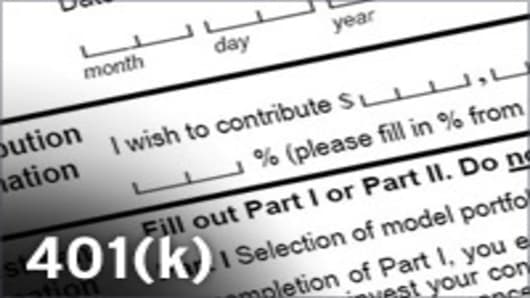The 401(k) match is making a comeback, a sign that the US economy is on the mend.
JPMorgan Chase Tuesdaybecame the latest big company to reinstate company matches to employee 401(k) plans, joining Starbucks, American Express andothers. which had previously eliminated contributions to reduce costs during the recession.
In past downturns, companies made similar suspensions of matches and then brought them back as the economy improved.
“There was definitely more companies cutting contributions this year, then say 2001,” after the dot-com bubble burst said Ed Ferrigno, vice president of Washington affairs at the Profit Sharing /401(k) Council of America.
“It’s not surprising” that matches are coming back, he added.
401(k) plans have become a significant part of an employee's retirement savings in recent years as more companies move to eliminate pensions. Typically, a company will match a certain percentage of the employee's own contribution to the plan, which is deducted from their regular paycheck.
Of those employers who cut or eliminated 401(k) contributions, 35 percent said they would reinstate them in the next six months, according to a survey conducted this month by Watson Wyatt, a human resources consulting firm. Another 15 percent said they would reinstate matches in the next 12 months.
The majority of companies are restoring matches to their previous level, said Robyn Credico national director of defined-contribution consulting at Watson Wyatt.
JPMorgan Chase said that it will bring back the 401(k) match this year after cutting it earlier in 2009. In addition, the company is giving U.S. employees that make under $60,000 a one-time $500 deposit into their 401(k) savings plan next year. Employees outside the U.S. will get the $500 bonus in their paycheck.
American Express announced at the end of September that it would begin making contributions again in January 2010 after cutting it earlier this year.
“Though these changes reflect a somewhat more positive outlook about economic conditions in the coming months, the challenges we face are far from over,” wrote Kenneth Chenault, the CEO of American Express, in a memo to employees announcing the reinstated match.
Rental car company Dollar Thrifty started contributing matches again in early 2009 after cutting them the year before.
Starbucks told employees in 2008 that their 401(k) match would be discretionary based on how the company performs. In July, the coffee retailer announced they would match contributions for the year.
Meanwhile, electronics maker Motorola expects to reinstate matches at some point in 2010.
While the group of companies that have cut contributions include some famous names, cutting matches was not as widespread as thought.
According to new data from Charles Schwab, 69 percent of employers are currently offering a match, and just 9 percent stopped making matches between a 19 month period ending July 31, 2009. Even if the group is small, the companies that did cut matches affect a large number of employees. American Express and Motorola, for example, employ over 60,000 people.
While the return of matches is a good sign, experts say, some companies are still waiting to reinstate cuts.
“Of those that did eliminate matches, most believe they will reinstate but they’re waiting to see what happens with health care,” said Mark Ritter, executive director of Grant Thornton LLP. He said companies who did cut were worried about being responsible for both 401(k) matches and increased health care costs next year.
“Health care is more expensive for companies than matching contributions,” he added.
(Editors Note: This article was updated from after original publish date in October 2009.)


